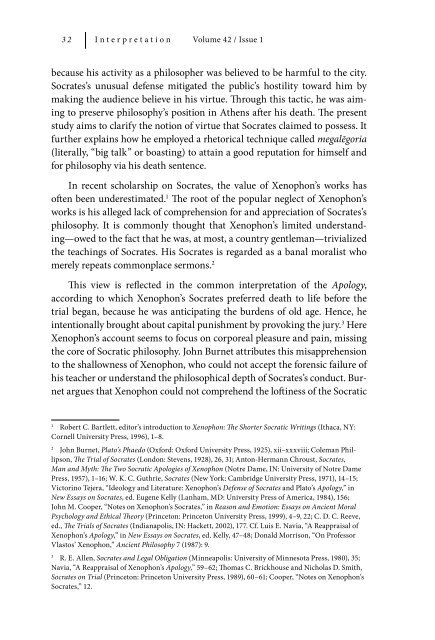Fall 2015
Vol_42_1
Vol_42_1
- No tags were found...
Create successful ePaper yourself
Turn your PDF publications into a flip-book with our unique Google optimized e-Paper software.
3 2 I n t e r p r e t a t i o n Volume 42 / Issue 1<br />
because his activity as a philosopher was believed to be harmful to the city.<br />
Socrates’s unusual defense mitigated the public’s hostility toward him by<br />
making the audience believe in his virtue. Through this tactic, he was aiming<br />
to preserve philosophy’s position in Athens after his death. The present<br />
study aims to clarify the notion of virtue that Socrates claimed to possess. It<br />
further explains how he employed a rhetorical technique called megalēgoria<br />
(literally, “big talk” or boasting) to attain a good reputation for himself and<br />
for philosophy via his death sentence.<br />
In recent scholarship on Socrates, the value of Xenophon’s works has<br />
often been underestimated. 1 The root of the popular neglect of Xenophon’s<br />
works is his alleged lack of comprehension for and appreciation of Socrates’s<br />
philosophy. It is commonly thought that Xenophon’s limited understanding—owed<br />
to the fact that he was, at most, a country gentleman—trivialized<br />
the teachings of Socrates. His Socrates is regarded as a banal moralist who<br />
merely repeats commonplace sermons. 2<br />
This view is reflected in the common interpretation of the Apology,<br />
according to which Xenophon’s Socrates preferred death to life before the<br />
trial began, because he was anticipating the burdens of old age. Hence, he<br />
intentionally brought about capital punishment by provoking the jury. 3 Here<br />
Xenophon’s account seems to focus on corporeal pleasure and pain, missing<br />
the core of Socratic philosophy. John Burnet attributes this misapprehension<br />
to the shallowness of Xenophon, who could not accept the forensic failure of<br />
his teacher or understand the philosophical depth of Socrates’s conduct. Burnet<br />
argues that Xenophon could not comprehend the loftiness of the Socratic<br />
1<br />
Robert C. Bartlett, editor’s introduction to Xenophon: The Shorter Socratic Writings (Ithaca, NY:<br />
Cornell University Press, 1996), 1–8.<br />
2<br />
John Burnet, Plato’s Phaedo (Oxford: Oxford University Press, 1925), xii–xxxviii; Coleman Phillipson,<br />
The Trial of Socrates (London: Stevens, 1928), 26, 31; Anton-Hermann Chroust, Socrates,<br />
Man and Myth: The Two Socratic Apologies of Xenophon (Notre Dame, IN: University of Notre Dame<br />
Press, 1957), 1–16; W. K. C. Guthrie, Socrates (New York: Cambridge University Press, 1971), 14–15;<br />
Victorino Tejera, “Ideology and Literature: Xenophon’s Defense of Socrates and Plato’s Apology,” in<br />
New Essays on Socrates, ed. Eugene Kelly (Lanham, MD: University Press of America, 1984), 156;<br />
John M. Cooper, “Notes on Xenophon’s Socrates,” in Reason and Emotion: Essays on Ancient Moral<br />
Psychology and Ethical Theory (Princeton: Princeton University Press, 1999), 4–9, 22; C. D. C. Reeve,<br />
ed., The Trials of Socrates (Indianapolis, IN: Hackett, 2002), 177. Cf. Luis E. Navia, “A Reappraisal of<br />
Xenophon’s Apology,” in New Essays on Socrates, ed. Kelly, 47–48; Donald Morrison, “On Professor<br />
Vlastos’ Xenophon,” Ancient Philosophy 7 (1987): 9.<br />
3<br />
R. E. Allen, Socrates and Legal Obligation (Minneapolis: University of Minnesota Press, 1980), 35;<br />
Navia, “A Reappraisal of Xenophon’s Apology,” 59–62; Thomas C. Brickhouse and Nicholas D. Smith,<br />
Socrates on Trial (Princeton: Princeton University Press, 1989), 60–61; Cooper, “Notes on Xenophon’s<br />
Socrates,” 12.


